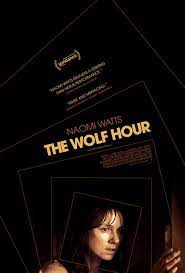
THE WOLF HOUR
US, 2019, 99 minutes, Colour.
Naomi Watts, Jennifer Ehle, Emory Cowan, Kelvin Harrison Jr, Jeremy Bobb, Brennan Brown.
Directed by Alastair Banks Griffin.
The Wolf Hour, the hour of the Wolf, is a dark hour of threat and change.
A warning, this is not a film for audiences who want action, even moderate action. The drama takes place in the one apartment in New York City, the audience being asked to identify with the writer, June (Naomi Watts), who has become agoraphobic, living in her grandmother’s inherited apartment, neglecting herself, fearful, increasing squalor. It is a tour de force performance by Naomi Watts. However, the audience is being asked to confine itself, identify with the character who is not entirely sympathetic, testing whether one agrees with her behaviour or not…
June has been a successful writer, a flashback of her being interviewed on television (by host Brennan Brown), discovering on-air that her father had killed himself the day before. Her novel had been critical of him, The Patriarch.
She is continually tormented by her buzzer and nobody answering, the buzz coming several times a day and even at night. The neighbourhood is squalid, kids playing in the street, gangs and violence, ultimately a blackout, looting and the police, fire is in the city. June looks out the window and we do with her.
The succession of people visiting dramatise her situation, her friend and fellow-author, Margot (Jennifer Ehle) making contact again, helping clean up, but an emotional clash. A policeman, a week later, responding to her complaint about harassment, and he being threatening and making an advance. There is Freddie, Kelvin Harrison Jr, who delivers the groceries, makes an impression on June, comes in to use her washbasins, asks for money to move her garbage bags and make deliveries. June also brings a dating service and a young man (Emory Cohen) arrives, in their encounter and talking, maybe June begins to come out of herself. And her publisher refuses to make any further payments of her advance until she sees a manuscript.
Eventually June does get to work, relies on Freddy to deliver it but it is the night of blackouts, fire and looting. She fears Freddie has been attacked and gradually comes down, out the front door, into the streets.
Ultimately, there is a positive ending.
- The title, the night, terrors?
- The New York setting, the city, neighbourhoods, 1977, gangs and violence, blackouts and looting, the police, assaults in the street, media warning about a murderer, buzzers ringing frequently and no one identifying themselves? Atmosphere?
- The action taking place in the one apartment, the interiors, the mess, clearing up, the various rooms, the bed, the desk, the kitchen stove, looking out the window to the street below, the views of New York, especially at the end with the fires and blackout? And June venturing out along the streets at the end? The musical score?
- June’s story, previous fame, the autobiographical novel, The Patriarch, a television interviewer, asking whether it was a portrait of her father? Then announcing his death on TV, she not aware? The apartment from her grandmother? Her mess, the grandmother’s mess? Books, newspapers? Garbage bags?
- June and her agoraphobia, the groceries coming from the shop, her phone calls to the store, Freddie and his deliveries, keeping him out, his coming in, using the wash basin, the issue of payment, the tip, payment for carrying the garbage bags, had he stolen the cigarettes? His return, June relying on him to get the manuscript to the publisher? His seeming disappearance?
- The phone call to Margot, the past relationship, working together, rivalry, Margot experiencing a decline, moving to the country? The visit, helping with the cleanup, conversations, arguments? The clash and Margot going?
- June, the landlord, the money under the door? Phoning the publisher, the advance, the publisher and her demands for the manuscript? The ultimate effect on June, trying to write, failures, eventually writing and finishing the manuscript? Relying on Freddy, $40, the only copy?
- Phoning the dating service, Billy, his story, adoption, meeting women, the evening with June, the buzzer, her telling her story? Listening to him? Enabling some freedom?
- The police officer, her complaint about the buzzer, taking a week to respond, his manner, limp, advance on her, threats?
- June, her age, experience, mental condition, fears, success, failure, the family story, her father’s death? Living in squalor? The possibility for breaking out?
- Her fearing Freddie was attacked, down the stairs, at the door, not Freddie, openly walking the street?
- The final sequence, the new book, the same interviewer, questioning whether it was autobiographical?